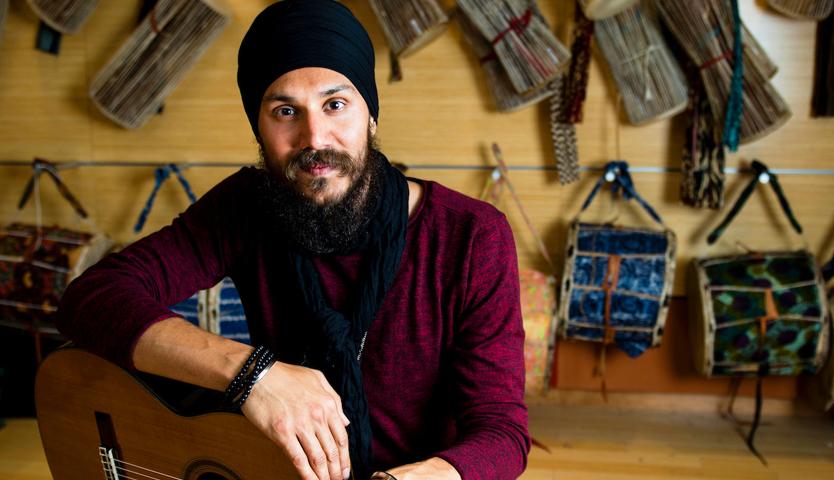From Tufts to New Grooves

By Kristin Livingston, A05
Growing up in Chicago and Wisconsin, Harjinder Singh, M.A. ‘18, heard music everywhere: Earth, Wind, and Fire in the kitchen, Mozart arias wherever his mother happened to be performing on a given day, songs of faith at the gurudwara where his Sikh family worshipped. Whenever the family traveled, Singh says he stuck his head into every rhythm that called to him, from Afro-Cuban jazz in the city to reggae in the Caribbean.
“My life experiences come from a place of multiplicity,” Singh says, meaning that no matter where he goes, he makes connections and creates experiences from the same root: music.
And Singh goes—and plays and teaches and performs—all over the world.
In Chicago, Singh led classes on reggae at the Old Town School of Folk Music, founded and managed a high school fine arts magnet program, and presented research on Ewe music and dance at the Midwest Society for Ethnomusicology. He also performed in the city with his group, Fatbook—and still travels back to Chicago for gigs. In Ghana, he volunteered on a cocoa farm to fund the first of four summer trips to Accra, where he studied drumming and dance. And in Boston, Singh performs with an Ethiopian funk group and commutes to Jamaica to research the musical traditions of the Maroon nation.
For someone so well-established and engaged in so many pursuits—why come to Tufts?
Fine-Tuning
It’s about fine-tuning—and a unique expertise.
“I came to Tufts to both continue my academic, research, and theoretical development, as well as my practical development as a musician and a dancer,” Singh says. And, over the past few years, he adds, exciting things have happened: Singh’s African music and dance has been energized and he’s working with Tufts’ distinguished faculty, like David Locke, in ethnomusicology and musicology.
The intimate setting of the graduate school means plenty of room for Singh to stretch his academic legs and flexibility to pursue what calls to him—like working in Jamaica.
“The fact that I’ve been able to go back to Jamaica and spend a lot of time unfolding this part of my life has been a really rich aspect of the last few years,” he adds.
Singh has been researching the music and dance of Maroons, descendants of Africans who escaped slavery or revolted in the 18th century and settled in Jamaica. “They’re the first autonomous resistance communities in the New World,” Singh says. “In Jamaica and Brazil, these communities have a strong commitment to African identity and a large link to Ghanaian and Ashanti culture. How is this realm of experience engaging the contemporary lives and culture of the people in Jamaica and America? How do we tell this story and give it the attention it deserves?”
Singh has logged countless hours interviewing Maroons and Jamaicans in the drumming and dance scene, as well as elders, a few of whom have passed away since he began the project. He also records music and is helping the community with their conference on Maroon and indigenous issues. Locke credits Singh’s success with the human-to-human connection and trust he’s developed with the community.
“Perhaps because he brought along his guitar and showed experienced flair with reggae music, local Jamaicans welcomed him warmly,” Locke says. He has been able to gain the trust of those with whom he is working, which is a key to successful ethnographic field work.”
“My hope is that by laying this history down in the academic realm, it will add to the collective narrative as well as create a relationship that continues into the future,” Singh says.
A Special Freedom
When he isn’t focused on his research project, Singh is a teaching assistant for Kiniwe music and dance courses. “As Professor Attah Poku’s teaching assistant, Harjinder has exemplified the respectful demeanor that is appropriate when studying with a traditional master,” Locke says. “His progress in Ashanti music and dance has been an inspirational model for students.” Teaching is at Singh’s core, and at Tufts, he has been able to share his love of West African music with students who might otherwise not have been exposed to non-Western music courses.
He’s also still performing with his Ethiopian funk band; the group is going on a European tour this fall. Singh says he’s appreciated having the space at Tufts to hone his skills as an instrumentalist; he plays a host of instruments from trumpet to guitar. And performing is unlike anything else in his life: “It’s that moment when all of your different experiences and journeys and complications and triumphs coalesce at the same time; that vulnerability and freedom is really special.”
Of his Tufts experience, expanding the multiplicity of music, Singh says, “Tufts has an outstanding faculty and gives you the challenge of developing yourself through a rigorous environment. Our program is unique and unusual, but it allows you to focus on a very specific project process.” Having that structure and ability to zero in on a single point of study for an extended period of time is something Singh says he probably wouldn’t have done without Tufts.
“It’s been a good challenge: figuring out how to unfold and execute that process and disseminate it, while becoming an expert on the topic—just one of many on my horizon.”